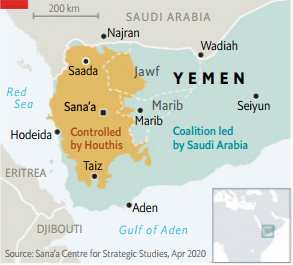The war in Yemen
也門(mén)戰(zhàn)爭(zhēng)
Looking for an exit
尋找出口
Saudi Arabia declares a ceasefire, while the Houthi rebels fight on
沙特阿拉伯宣布停火,而胡塞組織叛軍則繼續(xù)作戰(zhàn)
Rarely has Saudi Arabia sounded so magnanimous. For five years it has been fighting the Houthis, a group of Shia rebels in Yemen, on behalf of the government they toppled. The war has devastated Yemen's infrastructure and killed more than 100,000 people. But on April 8th Saudi Arabia and its allies promised to lay down their arms for two weeks. The reason for the ceasefire, said a Saudi official, was "to alleviate the suffering of the brotherly Yemeni people and maintain their health and safety". Two days later Yemen, the region's poorest country, announced its first confirmed case of covid-19.
很少聽(tīng)說(shuō)沙特阿拉伯如此大度。五年來(lái),沙特一直代表其所推翻的政府與也門(mén)什葉派胡塞武裝組織叛軍作戰(zhàn)。這場(chǎng)戰(zhàn)爭(zhēng)摧毀了也門(mén)的基礎(chǔ)設(shè)施,造成10萬(wàn)多人死亡。但4月8日,沙特阿拉伯及其盟國(guó)承諾將停火兩周。一位沙特官員說(shuō),停火的原因是“為了減輕兄弟之邦也門(mén)人民的苦難,維護(hù)他們的健康與安全”。兩天后,也門(mén),這個(gè)在該地區(qū)最貧窮的國(guó)家,宣布出現(xiàn)第一例新冠肺炎確診病例。
Cynics doubt that compassion is truly motivating Saudi Arabia, a majority Sunni nation. For years its bombs have hit hospitals, houses and schools in Yemen—often, it seemed, on purpose. Rather, the war is turning and the Saudis are losing heart.
沙特大部分信奉遜尼派伊斯蘭教,批評(píng)人士懷疑,沙特這么做是否真出于憐憫之心。 多年來(lái),其投下的炸彈襲擊了也門(mén)的醫(yī)院、房屋和學(xué)校,而這些往往都是故意為之。不如說(shuō),戰(zhàn)爭(zhēng)在轉(zhuǎn)變,令沙特人感到心灰意冷。

Despite its vicious air campaign, Saudi Arabia has been unable to dislodge the Houthis from most of Yemen's population centres, including the capital, Sana'a. Its main international ally, the United Arab Emirates, began scaling back its involvement in the war last year. The Saudis themselves are bombing less: their air strikes are down by more than 90% compared with 2015. In recent months they have held secret talks with the Houthis. Gone is the hope of returning Abd Rabbo Mansour Hadi, the exiled Yemeni president, to Sana'a. Now the kingdom's goal is to stop Houthi missile strikes on its own territory. "The Saudis want a way out and are using the coronavirus as a figleaf," says Abdulghani al-Iryani, a Yemeni analyst.
盡管沙特進(jìn)行過(guò)惡毒的空襲,但仍然無(wú)法將胡塞武裝組織趕出也門(mén)大部分人口聚集的中心地區(qū),包括首都薩那。其主要國(guó)際盟友阿拉伯聯(lián)合酋長(zhǎng)國(guó)去年開(kāi)始減少參與這場(chǎng)戰(zhàn)爭(zhēng),沙特自己也在減少轟炸襲擊的次數(shù):與2015年相比,其發(fā)起的空襲數(shù)量減少了90%以上。近幾個(gè)月來(lái),他們與胡塞武裝組織進(jìn)行過(guò)秘密會(huì)談。流亡也門(mén)總統(tǒng)阿布德·拉博·曼蘇爾·哈迪(Abd Rabbo Mansour Hadi)重返薩那的希望一去不復(fù)返,現(xiàn)在沙特的目標(biāo)是阻止胡塞組織的導(dǎo)彈對(duì)本國(guó)領(lǐng)土的襲擊。“沙特想要一條出路,并將新冠狀病毒作為遮羞布,”也門(mén)分析師阿卜杜勒加尼·艾里亞尼(Abdulghani al-Iryani)說(shuō)道。
The Saudi intervention began as a vanity project for Muhammad bin Salman, the crown prince, who sought to flex his muscles in the face of rival Iran. But the Houthis stood tough and Shia Iran, sensing an opportunity, increased its support for the rebels. Prince Muhammad is now looking at a quagmire that is diverting resources at a time of plummeting oil revenues. Houthi attacks on the kingdom threaten its reputation for stability. Their missiles have struck oil pipelines and targeted the capital, Riyadh.
沙特的干預(yù)行動(dòng)始于王儲(chǔ)穆罕默德·本·薩勒曼(Muhammad bin Salman)的一項(xiàng)政績(jī)工程,他試圖在對(duì)手伊朗面前大展拳腳。但是,胡塞組織立場(chǎng)強(qiáng)硬,什葉派盟友伊朗意識(shí)到時(shí)機(jī)到來(lái),就增加了對(duì)叛軍的支持。穆罕默德親王現(xiàn)在面對(duì)著,在石油收入暴跌之際轉(zhuǎn)移資源的困境。胡塞組織對(duì)沙特的襲擊威脅到其局勢(shì)穩(wěn)定的聲譽(yù),那些導(dǎo)彈襲擊了石油管道,還瞄準(zhǔn)了首都利雅得。
譯文由可可原創(chuàng),僅供學(xué)習(xí)交流使用,未經(jīng)許可請(qǐng)勿轉(zhuǎn)載。











